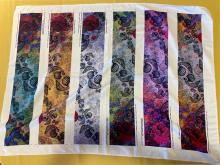For ║┌┴Ž═° undergraduate students who donŌĆÖt know where to start, research can be an exciting, but overwhelming experience. This doesnŌĆÖt have to be the case, though.
On Sept. 13, Kent State's Division of Research and Economic Development hosted a research and innovation forum for its Summer Undergraduate Research Experience (SURE) program, an eight-week research program that takes place during summer break. During the program, undergraduate students work directly with a faculty mentor to enhance their research skills, gain academic insight into their field of study as well as valuable experiences to clarify their career and education goals.
The Sept. 13 innovation forum featured undergraduate and faculty pairs who presented the results of the research they conducted over the eight weeks of the program. This year, three pairs presented at the forum.
Fighting Digital Crime

Allison Golubski, a criminology and justice studies junior, and Hedi Nasheri, Ph.D., professor of sociology, presented ŌĆ£An Assessment of Criminological Theories and Digital Crimes,ŌĆØ which focused on three criminal applicable theories that Golubski then studied and applied to the topic of digital crime with the help of Nasheri. The three criminal applicable theories they focused on were: deterrence theory, rational choice theory and routine activity theory.
Deterrence theory looks at the perceived threat of legal consequences in the deterrence of illegal activity. Rational choice theory weighs the potential benefits and risks associated with criminal activities. Routine activity theory consists of three main things: a motivated offender, a suitable target, and the lack of capable guardianship.
Golubski went on to explain a constant theme she found through her readings was criminal behavior being rooted in human nature. Because of this, Golubski hopes to be able to study how these criminal applicable theories can be applied to complex digital crimes, like AI crimes, and the insight they can bring to these digital crimes.
"If interactions between technology and human behavior continue, traditional criminal applicable theories will continue to provide an insight into the ever-evolving landscape of digital crime," Golubski said.
Digital Textile Technologies


J.R. Campbell, executive director of the Design Innovation Initiative, and Nadia Modjrian, a fashion design junior, presented how they used digital textile technologies to turn Persian cultural motifs into contemporary textiles. Modjrian took inspiration from her home country of Iran and incorporated letters of the Persian alphabet into one of her motifs.
Another of ModjrianŌĆÖs motifs consisted of a snake trapping a butterfly, representing the current climate of her home country. The snake represents the government, and the butterfly represents the people in Iran trying to break free. Modjrian also paid homage to the LGBTQ+ community, a community that is not accepted in her home country.

ŌĆ£The LGBTQ community has no right to live in my home country and are suffering. I wanted to pay tribute to them in this,ŌĆØ Modjrian said.
In the wings of the butterfly are the initials of the victims of the mosque attack that happened in early April 2023.
ŌĆ£I kept following the news, and I saw their names on social media, and I thought, ŌĆśyeah, thatŌĆÖs part of my culture. Why am I not using it in this context?ŌĆÖŌĆØ Modjrian said.
Campbell and Modjrian used the equipment in the Design Innovation Hub, including the dye sublimation printer, to print ModjrianŌĆÖs motifs onto fabric and bring them to life.
Racial Discrimination and Stress

Angela Neal-Barnett, Ph.D., psychology professor, and neuroscience junior Bria Shackleford closed the forum with their presentation titled ŌĆ£Exploring the Relationship Between Racial Discrimination and Stress Levels.ŌĆØ
Neal-Barnett and ShacklefordŌĆÖs research focused on looking to see if there is a difference in cortisol levels between African American students and others races of students.
ŌĆ£As a Black professor on a predominantly white campus, I get to see the stress of Black students on an almost everyday basis. It can be something as simple as ŌĆśOh my goodness, I'm the only one in this classroom,ŌĆÖ or it can be things that have happened in the classroom, somewhere on campus or off campus,ŌĆØ Neal-Barnett said.
Kent StateŌĆÖs Brain Health Research Institute awarded Neal-Barnett a grant that helped fund this research collaboration between her and Shackleford.
While the results were not quite what Shackleford had hypothesized, the study gave her a direction to continue her work as she pursues a career as a neurosurgeon and a researcher in neuroscience.
ŌĆ£If there was a follow-up study, I would like to look more into my theory of Black males being desensitized to racism and maybe to look at brain scans of individuals before and after seeing racist events,ŌĆØ Shackelford said.
The forum showcased not only the brightness of these Kent State students but also how the resources Kent State provides ŌĆō like the Summer Undergraduate Research Experience program ŌĆō that can help students excel in their chosen field of study.
ŌĆ£The SURE program is an outstanding way to take learning experiences from the classroom to meaningful hands-on experiences,ŌĆØ Ann Gosky, director of the office of student research, said. ŌĆ£SURE creates opportunities for students to become critical thinkers, independent learners, collaborative members of a team and exceptional problem-solvers, which are all traits that employers and graduate schools look for when hiring or admitting students.ŌĆØ
Learn more about the Summer Undergraduate Research Experience.

